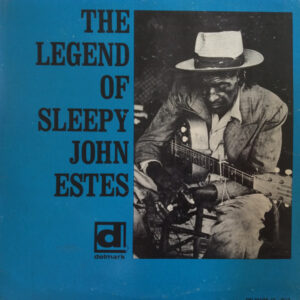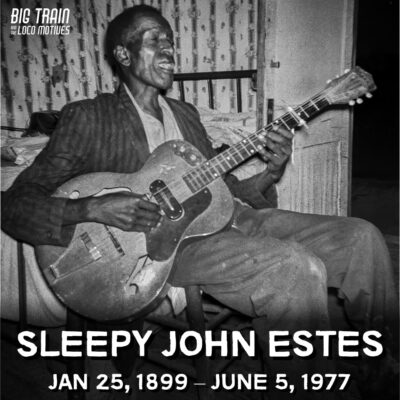
HEY LOCO FANS – We lost Sleepy John Estes on June 5 in 1977. Big Bill Broonzy called John Estes’ style of singing “crying” the blues because of its overt emotional quality. Actually, his vocal style harks back to his tenure as a work-gang leader for a railroad maintenance crew, where his vocal improvisations and keen, cutting voice set the pace for work activities.
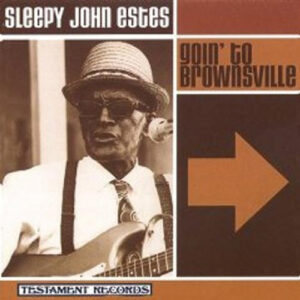 Nicknamed “Sleepy” John Estes, supposedly because of his ability to sleep standing up (although there’s more on this on a little further down), he teamed with mandolinist Yank Rachell and harmonica player Hammie Nixon to play the house party circuit in and around Brownsville in the early ’20s. The same team reunited 40 years later to record for Delmark and play the festival circuit. Never an outstanding guitarist, Estes relied on his expressive voice to carry his music, and the recordings he made from 1929 on have enormous appeal and remain remarkably accessible today.
Nicknamed “Sleepy” John Estes, supposedly because of his ability to sleep standing up (although there’s more on this on a little further down), he teamed with mandolinist Yank Rachell and harmonica player Hammie Nixon to play the house party circuit in and around Brownsville in the early ’20s. The same team reunited 40 years later to record for Delmark and play the festival circuit. Never an outstanding guitarist, Estes relied on his expressive voice to carry his music, and the recordings he made from 1929 on have enormous appeal and remain remarkably accessible today.
Despite the fact that he performed for mixed black and white audiences in string band, jug band, and medicine show formats, his music retains a distinct ethnicity and has a particularly plaintive sound. Astonishingly, he recorded during six decades for Victor, Decca, Bluebird, Ora Nelle, Sun, Delmark, and others. Over the course of 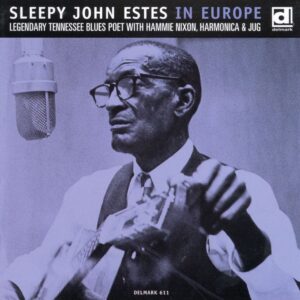 his career, his music remained simple yet powerful, and despite his sojourns to Memphis and Chicago he retained a traditional down-home sound. Some of his songs are deeply personal statements about his community and life, such as “Lawyer Clark” and “Floating Bridge.” Other compositions have universal appeal (“Drop Down Mama” and “Someday Baby”) and went on to become mainstays in the repertoires of countless musicians. One of the true masters of his idiom, he lived in poverty, yet was somehow capable of turning his experiences and the conditions of his life into compelling art.
his career, his music remained simple yet powerful, and despite his sojourns to Memphis and Chicago he retained a traditional down-home sound. Some of his songs are deeply personal statements about his community and life, such as “Lawyer Clark” and “Floating Bridge.” Other compositions have universal appeal (“Drop Down Mama” and “Someday Baby”) and went on to become mainstays in the repertoires of countless musicians. One of the true masters of his idiom, he lived in poverty, yet was somehow capable of turning his experiences and the conditions of his life into compelling art.
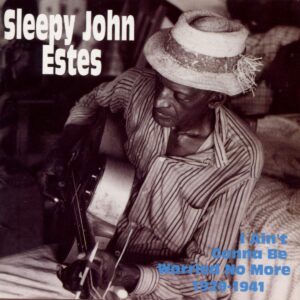 Estes was born in Ripley, Tennessee, either in 1899 (the date on his gravestone) or 1900 (the date on his World War I draft card). In 1915, his father, a sharecropper who played guitar, moved the family to Brownsville, Tennessee. Not long after, Estes lost the sight in his right eye when a friend threw a rock at him. At the age of 19, while working as a field hand, he began to perform professionally, mostly at parties and picnics, with the accompaniment of Hammie Nixon, a harmonica player, and James “Yank” Rachell, a guitarist and mandolin player. Estes continued to work on and off with both musicians for more than fifty years. He also performed in medicine shows with Willie Newbern.
Estes was born in Ripley, Tennessee, either in 1899 (the date on his gravestone) or 1900 (the date on his World War I draft card). In 1915, his father, a sharecropper who played guitar, moved the family to Brownsville, Tennessee. Not long after, Estes lost the sight in his right eye when a friend threw a rock at him. At the age of 19, while working as a field hand, he began to perform professionally, mostly at parties and picnics, with the accompaniment of Hammie Nixon, a harmonica player, and James “Yank” Rachell, a guitarist and mandolin player. Estes continued to work on and off with both musicians for more than fifty years. He also performed in medicine shows with Willie Newbern.
At the suggestion of Jim Jackson, Estes made his debut as a recording artist in Memphis, Tennessee, in 1929, at a session organized by Ralph Peer for Victor Records. He recorded the tracks “Drop Down Mama” and “Someday Baby Blues” with Nixon in 1935. He later worked with Son Bonds and Charlie Pickett. He later recorded for Decca Records and Bluebird Records, with his last prewar recording session taking place in 1941. He made a brief return to recording at Sun Studio in Memphis in 1952, recording “Runnin’ Around” and “Rats in My Kitchen”, but otherwise was out of the public eye in the 1940s and 1950s.
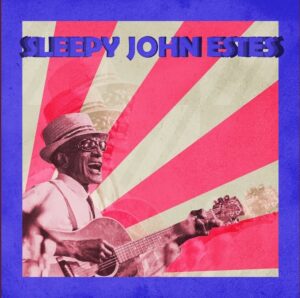 Estes sang with a distinctive “crying” vocal style. He frequently teamed with more capable musicians, such as Yank Rachell, Hammie Nixon, and the piano player Jab Jones. Estes sounded so much like an old man, even on his early records, that blues revivalists reportedly delayed looking for him because they assumed he would have to be long dead (and because the musician Big Bill Broonzy had written that he was dead). By the time he was tracked down by the blues historians Bob Koester and Samuel Charters in 1962, he was completely blind and living in poverty. He resumed touring with Nixon and recording for Delmark Records. Estes, Nixon and Rachell appeared at the Newport Folk Festival in 1964.
Estes sang with a distinctive “crying” vocal style. He frequently teamed with more capable musicians, such as Yank Rachell, Hammie Nixon, and the piano player Jab Jones. Estes sounded so much like an old man, even on his early records, that blues revivalists reportedly delayed looking for him because they assumed he would have to be long dead (and because the musician Big Bill Broonzy had written that he was dead). By the time he was tracked down by the blues historians Bob Koester and Samuel Charters in 1962, he was completely blind and living in poverty. He resumed touring with Nixon and recording for Delmark Records. Estes, Nixon and Rachell appeared at the Newport Folk Festival in 1964.
Many of Estes’s original songs were based on events in his life or people he knew in his hometown, Brownsville, such as the local lawyer (“Lawyer Clark Blues”), the local auto mechanic (“Vassie Williams’ Blues”), or an amorously inclined teenage girl (“Little Laura Blues”). In “Lawyer Clark Blues”, about the lawyer and later judge and senator Hugh L. Clarke, whose family lived in Brownsville, Estes sang that Clark let him “off the hook” for an offense. He also dispensed advice on agricultural matters (“Working Man Blues”) and chronicled his own attempt to reach a recording studio for a session by hopping a freight train (“Special Agent [Railroad Police Blues]”). His lyrics combined keen observation with an ability to turn an effective phrase.
Some accounts attribute the nickname Sleepy to a blood pressure disorder or narcolepsy. Bob Koester, the founder of Delmark Records, said that Estes simply had a “tendency to withdraw from his surroundings into drowsiness whenever life was too cruel or too boring to warrant full attention”. Estes himself explained that the nickname was born of his exhausting life as both musician and farmer. “‘Every night I was going somewhere. I’d work all day, play all night and get back home about sunrise. I’d get the mule and get right on going. I went to sleep once in the shed. I used to go to sleep so much when we were playing, they called me Sleepy. But I never missed a note.'”

